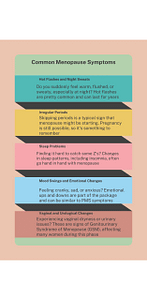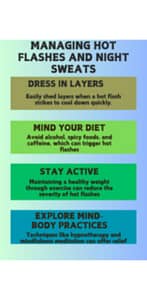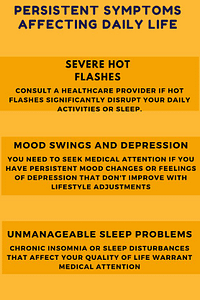Menopause marks a significant shift in a woman’s life, signaling the end of menstrual cycles and fertility. It typically occurs in the 40s or 50s, with the average age in the US being 51. This natural biological process brings with it decreasing levels of estrogen, leading to various physical and emotional signs and symptoms of menopause. From sleep disturbances and emotional changes to shifts in sexual function, the effects of menopause touch on nearly every aspect of life.
Understanding these changes is crucial, not just for those going through them but also for their loved ones. In this article, we’ll explore the signs and symptoms of menopause in women, covering everything from early symptoms of menopause at 46 to what happens during menopause and how long menopause lasts. Through lifestyle modifications and hormone therapy, there are effective treatments to manage menopause symptoms, echoing the need for awareness and open conversation about this natural part of aging.
Understanding the Stages of Menopause
Menopause isn’t just a single event but a journey through different stages, each with unique characteristics and challenges. Let’s break it down in a way that’s easy to understand.
The Three Main Stages
- Perimenopause: This is the kickoff stage and can start as early as 8 to 10 years before menopause. During this time, the ovaries gradually make less estrogen, which might lead to symptoms like hot flashes or irregular periods. It’s like the body is giving a heads-up that changes are coming.
- Menopause: This stage is the main event! It’s officially confirmed when a woman hasn’t had her period for 12 straight months. It means the ovaries have taken a permanent break from releasing eggs, and estrogen levels have dropped significantly. At this point, fertility bids farewell.
- Postmenopause: After crossing the menopause milestone, you enter the postmenopause phase, which lasts for the rest of your life. Though many symptoms of menopause might ease up, this stage comes with its own set of health considerations, like a higher risk for osteoporosis and heart disease due to the lower estrogen levels.
Understanding these stages helps one know what to expect and when to talk to a healthcare provider about managing symptoms or health concerns. It is important to emphasize that each woman’s journey through these stages is unique.
Recognizing Symptoms and Signs of Menopause
Why It Matters
Understanding these symptoms is crucial because they can impact your daily life and overall well-being. If you’re noticing these changes, chat with your doctor about them. They can offer advice, support, and treatment options to help manage the symptoms. Regular check-ups are essential during and after menopause for preventive health care.
Some women might breeze through it with few issues, while others might find the symptoms more challenging. Knowing what to expect can make the journey easier to navigate.
Dietary Considerations
- Phytoestrogens: These are compounds naturally found in plants, so incorporating foods like soybeans, tofu, and flaxseeds into your diet may offer modest benefits.
Hot flashes, affecting about 75% of women, are the most common symptom of menopause. By combining lifestyle changes, medical interventions, and mind-body techniques, managing these symptoms can become more manageable, improving quality of life during this transition phase.
Memory Lapses and Concentration Issues
Menopause isn’t just about the physical changes; it also brings along some neurological and cognitive shifts that can be frustrating.
- Memory Lapses can be pretty frustrating. Imagine entering a room and forgetting why you’re there, names, appointments, or where you left your keys—it happens more often during this phase.
- Concentration Difficulties: Struggling to focus on your work or daily activities can indicate cognitive changes.
This isn’t just you being forgetful or distracted; it’s a standard part of the menopause journey.
Why It Happens
Estrogen, which sees a decline during menopause, is not just about reproductive health; it also impacts brain functions, including memory and concentration.
Coping Strategies
While these changes can be troubling, there are ways to manage them effectively:
- Stay Organized: Use planners, reminders, and lists to keep track of important tasks and dates.
- Mindfulness and Meditation: These practices can improve focus and reduce stress, which might exacerbate memory issues.
- Brain Exercises: Engage in activities that challenge your brain, like puzzles, learning a new language, or playing musical instruments.
Understanding that these neurological and cognitive effects are normal for menopause can alleviate some stress. If these changes significantly impact your life, discussing them with your healthcare provider is crucial. They can offer further insights and support to help you navigate this transition more smoothly.
Hormone Replacement Therapy (HRT) and Menopause-Specific Fatigue
- HRT for Emotional Symptoms: While Hormone Replacement Therapy can help alleviate some emotional symptoms linked to menopause, it’s not a one-size-fits-all solution, especially for more severe cases of depression.
- Combating Fatigue: Menopause-specific fatigue can be addressed through medication and other interventions like hypnosis, which has shown promise in alleviating this symptom.
Seeking Support for Depression
Menopause can lead to depression for some women. If you’re experiencing persistent sadness or loss of interest in activities you once enjoyed, it’s crucial to seek medical advice. Professional mental health support can provide the necessary guidance and treatment.
Incorporating these strategies and seeking support when needed can help manage the emotional and psychological effects of menopause, leading to a more balanced and fulfilling life during this transition.
Navigating Vaginal and Urological Changes
Navigating the changes in vaginal and urological health during menopause can be challenging, but understanding your options can make a big difference.
Genitourinary Syndrome of Menopause (GSM) encompasses various symptoms, including vaginal dryness, pain during intercourse, and increased urinary tract infections. Knowing when to seek help and what treatments are available is crucial.
Coping Strategies
- Arousal Time: Allowing more time to become aroused during intercourse can help manage GSM symptoms.
- Avoid Irritants: Steer clear of scented soaps, bubble baths, douching, or feminine hygiene sprays.
- Nonhormonal Options: Nonhormonal vaginal lubricants, moisturizers, and mucosal lidocaine are effective for some women.
The Impact of Menopause on Daily Life
Menopause can significantly affect daily life, including relationships, work, and overall well-being. The emotional and physical symptoms can disrupt quality of life, leading to challenges such as loss of interest in sex and intimacy or a decrease in confidence. It’s essential to recognize these impacts and seek appropriate support.
Lifestyle Modifications and Treatment Options
In addition to medical treatments, lifestyle changes and nonhormonal therapies can provide relief:
- Self-Calming Skills: To manage emotional changes during menopause, it’s important to incorporate lifestyle adjustments and learn self-calming techniques.
- Creative Outlets: Engaging in creative activities can be a powerful way to express emotions and reduce stress. Find something that brings you joy, whether painting, writing, or gardening.
- Staying Connected: Maintaining strong connections with family, friends, and community can provide essential support. Nurturing friendships is especially crucial during this time.
- Quitting Smoking: Tobacco can trigger early menopause and symptoms like hot flashes. Seeking support from cessation programs can be beneficial.
- Nutritional adjustments: A nutritious diet is pivotal in managing menopause symptoms. Emphasizing fruits, vegetables, and proteins while ensuring adequate calcium and vitamin D intake supports overall health and bone strength. Foods like almonds, spinach, and fortified products are beneficial.
- Limiting Alcohol: Avoiding tranquilizers and alcohol can also make a significant difference in how you feel. To reduce the risk of breast cancer, it’s advised to limit alcohol intake to no more than one serving per day.
- Maintaining a Healthy Weight: Adopting a Mediterranean diet, rich in fruits and vegetables and low in added sugar, can help manage weight gain during menopause.
- Regular Exercise: Staying active helps maintain strength and flexibility, which are crucial during menopause. Cardiovascular and weight-bearing exercises are recommended to reduce osteoporosis risk and manage weight.
- Hydration: Drinking 8-12 glasses of water daily can aid in weight management and alleviate dryness symptoms.
- Hormone Therapy and Alternatives: If you prefer not to change your lifestyle, then you could consider hormone therapy and discuss it with your specialist. It stabilizes estrogen and progesterone levels and is available in various forms like pills, patches, and gels.
- Seek Professional Advice: If you experience vaginal bleeding after menopause, it’s essential to consult a specialist.
Open Communication with Healthcare Providers
It’s crucial to openly discuss menopausal symptoms with healthcare providers to ensure you receive tailored support and treatment, making the menopausal transition smoother.
Here’s a guide to help you understand the signs that warrant a visit to the doctor:
Unusual Symptoms
- Vaginal Bleeding After Menopause: Any vaginal bleeding post-menopause is considered abnormal, and you must seek medical attention.
- Excessive Weight Gain: Sudden or excessive weight gain without diet or activity level changes can indicate hormonal imbalances that need medical intervention.
- Severe Pain During Intercourse: Painful intercourse, especially if accompanied by vaginal dryness that doesn’t improve with over-the-counter lubricants, should be assessed by a doctor.
Concerns About Bone Health
- History of Osteoporosis in the Family: If you have a history of osteoporosis, it is advisable to discuss bone density testing and preventive measures with your doctor.
- Frequent Fractures or Bone Loss: Experiencing frequent fractures or being informed about bone loss should prompt a consultation for potential osteoporosis treatment.
General Health Screenings
- Regular Check-Ups: Scheduling regular check-ups during and after menopause is essential for preventive health care, including screenings for breast cancer, cervical cancer, and heart disease.
Informed and proactive care makes your menopause transition smoother. Talk to your doctor about your concerns.
Conclusion
Menopause is a journey. Knowledge & support ensure a smoother transition, as explored in this article. Lifestyle changes, medical help, and check-ups: be proactive during menopause for better well-being. (
Empower yourself! Follow advice, listen to your body, seek support, and explore treatment options for a better menopause. Remember, menopause is a universal experience for women, yet each journey is unique. Embracing this phase with awareness and care paves the way to a fulfilling, healthy life post-menopause.
FAQs
1. What are the characteristics of menopause-related fatigue?
Menopause-related fatigue is characterized by a persistent sense of exhaustion that significantly diminishes energy levels and motivation. This type of fatigue can adversely affect one’s ability to concentrate and generally lower one’s quality of life. It also impacts one’s emotional and psychological health, which is a common experience among women undergoing menopause.
2. What is the most common symptom experienced during menopause?
The most common symptom of menopause is hot flashes. These are brief sensations of intense heat that can occur suddenly.
3. How does anxiety manifest during menopause?
During menopause, anxiety is a frequent symptom that can make you feel stressed, fearful, or tense. This anxiety can also have physical manifestations, such as palpitations, and may exacerbate other menopausal symptoms like hot flashes.
4. Are there foods that can postpone the onset of menopause?
Yes, certain foods are associated with delaying menopause. Oily fish, legumes, and Vitamin D may delay or reduce early menopause risk (British study)
References
- Menopause: https://www.mayoclinic.org/diseases-conditions/menopause/symptoms-causes/syc-20353397
- How do I know if I am in menopause? https://www.webmd.com/menopause/understanding-menopause-symptoms
- Menopause: https://my.clevelandclinic.org/health/diseases/21841-menopause
- Hot flashes: what can I do? https://www.nia.nih.gov/health/menopause/hot-flashes-what-can-i-do
- Introduction to menopause https://www.hopkinsmedicine.org/health/conditions-and-diseases/introduction-to-menopause
- Do I need to see a doctor for menopause? Postmenopausal bleeding – NHS
- Menopause and memory- know the facts https://www.health.harvard.edu/blog/menopause-and-memory-know-the-facts-202111032630
- Psychological and climacteric symptoms and attitudes toward menopause https://www.ncbi.nlm.nih.gov/pmc/articles/PMC7400692/
- Vaginal atrophy https://my.clevelandclinic.org/health/diseases/15500-vaginal-atrophy
- The emotional roller coaster of menopause https://www.webmd.com/menopause/emotional-roller-coaster
- Lifestyle changes for menopause https://nyulangone.org/conditions/menopause/treatments/lifestyle-changes-for-menopause
- 11 Natural remedies for menopause relief https://www.healthline.com/nutrition/11-natural-menopause-tips
- Osteoporosis https://www.nhs.uk/conditions/osteoporosis/
- Dietary intake and age at natural menopause: Results from the UK women’s cohort study.
This website may contain affiliate links, and we may earn a commission for any purchases you make on affiliate websites using these links. Our affiliates include Clickbank. Rest assured, these affiliate links come at no additional cost to you.


